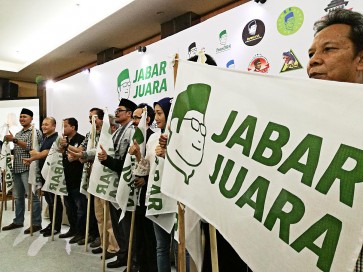Popular Reads
Top Results
Can't find what you're looking for?
View all search resultsPopular Reads
Top Results
Can't find what you're looking for?
View all search resultsImpacts of 2018 elections on Indonesian economy
According to the General Elections Commission (KPU), the simultaneous local elections will cost the central and local governments Rp 11.3 trillion (US$850 million).
Change text size
Gift Premium Articles
to Anyone
I
ndonesia is bracing for simultaneous elections across 171 regions later this year and the preparations are ongoing. These elections are critical as they will directly determine the leadership of key rich provinces, such as East Kalimantan, Riau, South Sulawesi and the three most populous provinces in Java.
With almost 70 percent of Indonesia’s population expected to vote, the parties winning the upcoming elections may influence the political dynamics of future national leadership. The economy, too, is likely to gain momentum as political spending rises. According to the General Elections Commission (KPU), the simultaneous local elections will cost the central and local governments Rp 11.3 trillion (US$850 million).
On top of this official cost of administering the elections and counting the votes, there is also the price of maintaining security and order. Additionally, there is also spending incurred by political parties and candidates on media campaigns, lobbying and, perhaps, vote-buying.
These multiple costs inflate the amount of election spending. In the 2014 general election for example, Bank Indonesia estimated that election-related spending provided the national gross domestic product (GDP), which at the time was suffering from low commodity prices, with a boost of 0.1 percent, or nearly $9 billion.
According to Home Ministry research and development data on the 2015 local elections, the cost for a candidate pair running for a city or regency leadership could reach Rp 30 billion, while for gubernatorial leadership the cost rose to the tune of Rp 100 billion.
With elections held in 17 provinces, 39 cities and 115 regencies in June, the total cost incurred by candidates could amount to Rp 6.3 trillion. Considering all costs combined, for such high spending, there is a need to determine whether, and in what manner, the local elections will impact on the Indonesian economy.
Arguably, the impacts of the local elections on the national economy can be grasped in three ways:


















